Contents
Got Milk? Let’s Do Some Hair!
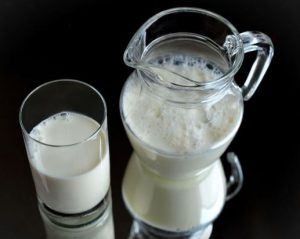
Yes!! Using milk and your hair is one more way that you can enhance the beauty of your hair on the outside – and naturally, on the inside, the wonders are amazing. It can come in various forms – powdered, pasteurized, cream of milk, yogurt – these are just a few ways we can find milk and then incorporate it into our hair care. Let’s see how we can use milk and your hair to your benefit for healthy hair.
What Is Milk?
According to Wikipedia, ‘milk is a white liquid produced by the mammary glands of mammals. It is the primary source of nutrition for infant mammals (including humans who breastfeed) before they are able to digest other types of food. Early-lactation milk contains colostrum, which carries the mother’s antibodies to its young and can reduce the risk of many diseases. It contains many other nutrients including protein and lactose’.[1]
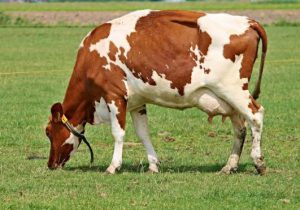
So, in layman terms, milk is what is produced from mammals and what is also chock-full of healthy stuff for our bodies. Then along comes technology and their job is to mimic the goodness of Mother Nature and then we have milk being made from other sources as well, and also being enhanced with all the goodness that is still needed to make it worthwhile for our use.
Now, this can be a good thing and a not so good thing, it all depends on the processes that are used to produce the end product.
The Chemical Makeup of Milk
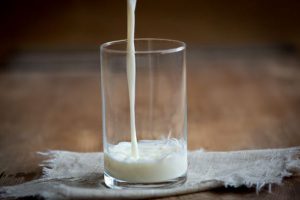
Milk is chock-full of goodness for everyone – babies, young, and old!
Milk is made up of:
- fat globules
- dissolved carbohydrates
- and protein aggregates with minerals such as calcium, phosphate, magnesium, sodium, potassium, citrate, and chlorine
It should also be noted that there is a presence of Vitamins A, B6, B12, C, D, K, E, thiamine, niacin, biotin, riboflavin, folates, and pantothenic acid. There are other enzymes, salts, and minerals, however, I want to keep it simple.
How Do We Make Milk

Manually milking a cow
The more common way of ‘making milk’ is by milking (manually or mechanically) the animals which produce milk naturally. Once they are milked, the milk then undergoes other treatment processes to make it ready for human consumption. The milk treatment processes can range from:
- pasteurization – ‘is used to kill harmful Pathogenic bacteria by heating the milk for a short time and then immediately cooling it.'[2]
- microfiltration – ‘is a process that partially replaces pasteurization and produces milk with fewer microorganisms and longer shelf life without a change in the taste of the milk.'[3]
- creaming and homogenization – ‘a treatment that prevents a cream layer from separating out of the milk.'[4]
- UHT – ultra heat treatment – ‘is a type of milk processing where all bacteria are destroyed with high heat to extend its shelf life for up to 6 months, as long as the package is not opened.'[5]
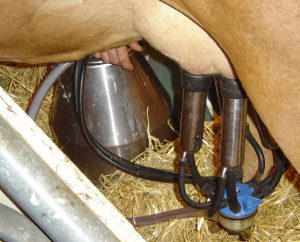
Cow milking machine
Various Forms of Milk
Milk can come in various forms. A few of the more common product forms are:
- milk powder
- yogurt
- cheese – soft, creamy, hard
- fermentation – buttermilk
- condensed or sweeten milk
- additives
- coagulation – cottage cheese
- fat content – heavy cream, 1-3%, skim milk
Types of Milk
According to Wikipedia, ‘In food use, the term milk is defined under Codex Alimentarius standards as: ‘the normal mammary secretion of milking animals obtained from one or more milkings without either addition to it or extraction from it, intended for consumption as liquid milk or for further processing.'[6]
So, when it comes to classifying other liquids as milk, for example, plant-generated products, this will be referred to as milk substitutes per se. The processes will vary, however, the outcome will be the same – this creamy liquid called milk but with a different taste and consistency. I have highlighted a few of the more common types of milk substitutes/beverages that might be more familiar:
The More Common Types of Animal-Produced Milk:
- cow
- buffalo
- goat
- sheep
- camel
- donkey
- horse
- moose
- seal
- whale
- reindeer, and
- yak
Did you know that goats account for 2% of the world’s milk and buffaloes 11%?

Benefits of Milk and Your Hair
What really helps to make the hair supple when you use milk as a part of your hair care is the fat content. It helps to make the hair feel glossy and naturally gives it a superb sheen. The natural fat globules coat the hair strands and effectively smooths the cuticles.
Other benefits include:
- softness
- shine
- mild strengthening
- a natural gel
- closes cuticles
Recipes for Milk and Your Hair
Milk Rinse
Using milk as a hair rinse is nothing new. The women in Egypt used milk for their hair and their entire body as well.
Milk powder 2-4 tablespoons
Warm water
Method
Mix the powder with warm water in a small bowl until it is completely smooth. Add to freshly washed hair and cover with a plastic cap. Leave hair covered for about 5-10 mins. Rinse thoroughly. Style as usual. You can also use already made milk from a carton – simply dilute with a little water if you like. You can even supplement the milk powder mixture with some milk from the carton as well.
Coconut Milk Conditioner
4-8 tablespoons coconut cream/milk
Method
Saturate freshly washed hair with the coconut milk, cover with a plastic cap and keep covered for 15-30 mins. Rinse and style as usual. Your hair should feel soft and shiny after the first use, and with regular use as well.
Coconut Milk Shampoo
4-8 tablespoons coconut milk
1/2 cup liquid Castille soap
Method
Mix ingredients together in a clean bottle. Use as a hair cleanser. Store in refrigerator after use. It is recommended to only make enough for a few washes.
Coconut Milk Deep Conditioner
4-6 tablespoons coconut milk/cream
2-4 tablespoons Greek yogurt
2 tablespoons olive oil
Method
Mix ingredients together to produce a smooth consistency. Apply to freshly cleansed hair, cover with a plastic cap. Leave covered for 15-30 mins. Rinse and style as usual.
My Final Thoughts about Milk and Your Hair!
I have used milk in my hair care regimen and I love it!
My favorite is the coconut cream/milk recipes. As a matter of fact, I just LOVE anything coconut. Coconut oil is my ‘go to’ product in most of my hair care practices. Have you tried milk for your hair?
I would love to hear your feedback as well as any recipes that work wonders for your tresses.

REFERENCES
[1-6] Wikipedia

How would you like to learn how to post on a blog like this one?
You can put your thoughts on paper but learning how to build your own blog is something different. If you have the right training it is not that difficult.
When you learn how to build your own blog you get to choose the things that you write about. You can also use the blog to make extra income. Here is where I learned how to build my own blog and connect with people who helped me along the way.

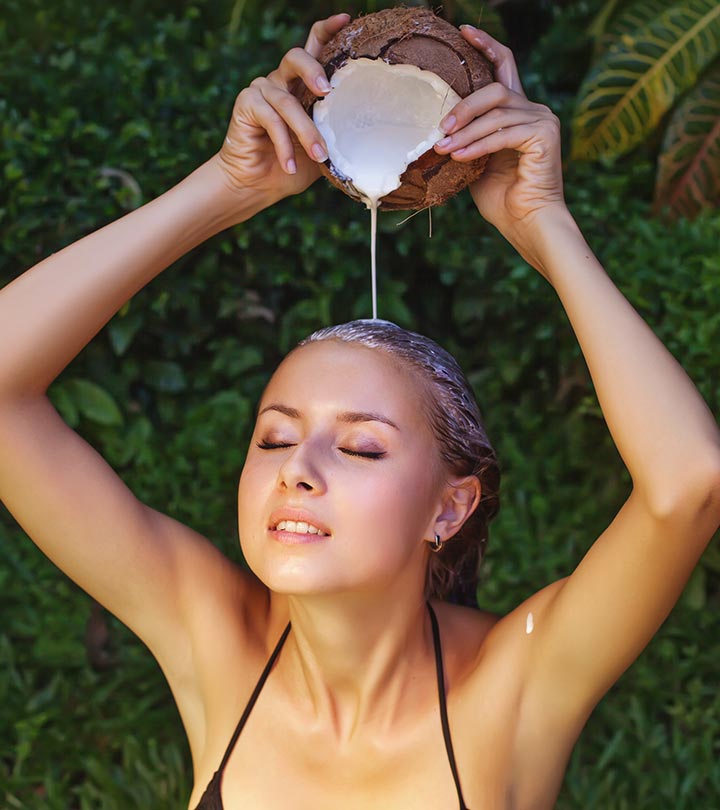
Michelle, I didn’t realize milk was good for hair. On the other hand, I am male so that explains it. But all kidding aside according to your article we all could use milk when washing our hair. I have not tried milk, but the next time I wash my hair I will be using milk. I appreciate that you give us a recipe for not only washing, but rinsing and as a conditioner as well. Thanks for this timely article.
All the best to you,
Don
Hello there, Don. Thanks for stopping by. You made me laugh – guys have hair too, you know! Yes, milk can do a body good – inside and out. The Egyptians were onto something back then. Their milk baths were to die for!! I am glad that you found the article as an eye opener and even more fun that you would be willing to give it a try. Well, if and when you do, be sure to stop by again and share your results.
Namaste
I have heard about milk being good for your hair but I have never really looked into it. I have used coconut milk before and I loved the healthy shine result. Thank you for these timely information and for the milk hair care recipes, I will try all of them soon. have a wonderful day!
Hello there Lilibeth,
Thanks for visiting my cyber space. Yes, milk does have some untold value especially when it comes to our hair – male or female crowning glory! I love coconut milk as well, if you have some time, you can check out another article I wrote about the coconut – its oil and its milk and its benefits. If you choose to use coconut milk regularly in your hair care regimen, I guarantee you that you will a difference in your mane attraction. Enjoy the recipes and if your time permits, please let me know how the whole process went as well as if you create any recipes on your own.
Much success.
Michelle
Hey Michelle,
Wonderful website and awesome information, Actually, I never knew that milk was so helpful like that and that it can even be used for the hair. I really love your picture illustrations on how cows are milked, you made things very simpler and easier to understand.
I also didn’t know all the steps used in milk processing. You have really educated me and even helped me to know that most of the milk we eat are from goat and buffalo. I didn’t know that, I thought we only get milk from cow.
Thank you so much for also helping me to know all the nutritional values of milk.
Hello there, Stephen,
Thanks for stopping by my cyber spot.
Thanks for your compliment. Yes, we can use milk in our hair care indeed!There is so much in Mother Nature that we can make use of, not just for our hair but our bodies as well.
And yes, I, too, did not realize that cow’s milk was not the predominant source of milk for human consumption.
Thanks for reading and you are welcome.
Michelle
Wow! Really? Wouldn’t milk make your hair smell?
Obviously you would have to wash it out but I honastly didn’t know that milk could be used in this way, I just showed my wife and she wants to send me to the shops now to get more milk, cheers for that.lol.
What an eye opener this post has been, thanks
LOL…too funny, Matthew. Look on the bright side…this article has strengthened the bond between you and your wife, given you some exercise time, and changed your outlook on ‘milk and your hair’.
LOL…thanks and you are welcome…LOL
All in good fun.
Yes, if you leave the milk on your hair, chances are, it will smell…so, please do wash it out and follow the recipes. And while you are at it, lemme know if you come up with any new ones.
And something for you, maybe you should give my article ‘Beer And Your Hair’ a read…something more ‘up your alley’ perhaps?? lol
Thanks for stopping by.
Michelle
Hi Michelle,
It is eye opening! I don’t know that milk has direct effects on hair growth. Right now my hair loss is a big problem. Everyday I lose some hair. I would like to stop this. I see you also have milk recipe for hair health. I bookmarked your website and will try your recipe in the weekend. Thanks for sharing.
Hello Anthony,
Thanks for visiting. I am glad you found the information useful. Yes, milk is good for the body, inside and out. I hope you get a chance to try out the recipe for a while and do let me know the outcome. All the best.
Michelle
Hey Michelle, I didn’t know that goats and buffalo contributed to the supply of milk. I was going to ask the same thing as Matthew did about the milk going sour and smelling, let alone making your hair oily and grimy. So it’s good to know that you do wash it out. LOL
My sisters inherited course hair from out mother, would this help soften it up?
Kim
Hello Kim,
Thanks for stopping by. LOL, yes, you need to wash the milk out of your hair or the smell will haunt you and tell others your tale! LOL. Yes, it should indeed help your sisters hair as long as they do it consistently, let’say once a week to start off, they should see some difference in how their hair feels after. Be sure to let me know how it turned out.
All the best.
Michelle
Michelle,
You take me back to my youth, when I milked the cows on the farm. The auto milkers came latter. I never used it on my hair before, can it start new growth.
We do have some of the Almond milk in the fridge, does hole milk do a better job for conditioning hair.
Does it state how long to leave the milk in your hair before you rinse it out, I missed that somewhere.
John
Hello John,
Thanks for your visit. Yes, the auto milkers did come later! LOL…yes, I think almond milk would be fine. Almond oil is a great softener for your hair so I think the almond milk should be fine. Normally, you should allow the milk to stay on your hair for about 15 mins. Lemme know if you decide to take the adventure.
Michelle
Hi Michelle, I keep hearing great things about Coconut oil and Coconut milk, both are great for your hair and other uses. It is so strange that when we were young, if we spilled milk in our hair we’d feel the need to wash it – at least I’m sure that’s what my mom would have done. Now, we are using milk as part of our conditioning process. Thanks for sharing!
Hello Tara,
Thanks for visiting. Yes, coconut milk and milk, in general, can do the body good…inside and outside. And yes, in days gone by, the use of milk for anything other than cooking, drinking and anything non-food related. Yes, times are a-changing indeed. Give it shot and do lemme know how it turns out.
Michelle